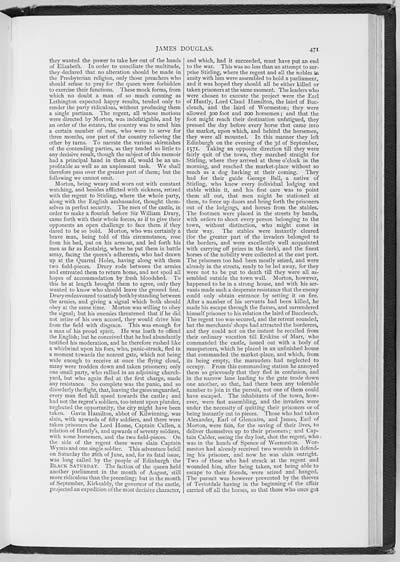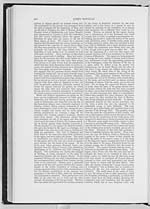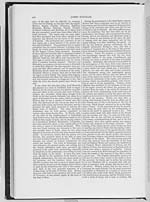471
they wanted the power to take her out of the hands
of Elizabeth. In order to conciliate the multitude,
they declared that no alteration should be made in
the Presbyterian religion, only those preachers who
should refuse to pray for the queen were forbidden
to exercise their functions. These mock forms, from
which no doubt a man of so much cunning as
Lethington expected happy results, tended only to
render the party ridiculous, without producing them
a single partisan. The regent, all whose motions
were directed by Morton, was indefatigable, and by
an order of the estates, the country was to send him
a certain number of men, who were to serve for
three months, one part of the country relieving the
other by turns. To narrate the various skirmishes
of the contending parties, as they tended so little to
any decisive result, though the subject of this memoir
had a principal hand in them all, would be an un-
profitable as well as an unpleasant task. We shall
therefore pass over the greater part of them; but the
following we cannot omit.
Morton, being weary and worn out with constant
watching, and besides afflicted with sickness, retired
with the regent to Stirling, where the whole party,
along with the English ambassador, thought them-
selves in perfect security. The men of the castle, in
order to make a flourish before Sir William Drury,
came forth with their whole forces, as if to give their
opponents an open challenge to face them if they
dared to be so bold. Morton, who was certainly a
brave man, being told of this circumstance, rose
from his bed, put on his armour, and led forth his
men as far as Restalrig, where he put them in battle
array, facing the queen's adherents, who had drawn
up at the Quarrel Holes, having along with them
two field-pieces. Drury rode between the armies
and entreated them to return home, and not spoil all
hopes of accommodation by fresh bloodshed. To
this he at length brought them to agree, only they
wanted to know who should leave the ground first.
Drury endeavoured to satisfy both by standing between
the armies, and giving a signal which both should
obey at the same time. Morton was willing to obey
the signal; but his enemies threatened that if he did
not retire of his own accord, they would drive him
from the field with disgrace. This was enough for
a man of his proud spirit. He was loath to offend
the English; but he conceived that he had abundantly
testified his moderation, and he therefore rushed like
a whirlwind upon his foes, who, panic-struck, fled in
a moment towards the nearest gate, which not being
wide enough to receive at once the flying cloud,
many were trodden down and taken prisoners; only
one small party, who rallied in an adjoining church-
yard, but who again fled at the first charge, made
any resistance. So complete was the panic, and so
disorderly the flight, that, leaving the gates unguarded,
every man fled full speed towards the castle; and
had not the regent's soldiers, too intent upon plunder,
neglected the opportunity, the city might have been
taken. Gavin Hamilton, abbot of Kilwinning, was
slain, with upwards of fifty soldiers, and there were
taken prisoners the Lord Home, Captain Cullen, a
relation of Huntly's, and upwards of seventy soldiers,
with some horsemen, and the two field-pieces. On
the side of the regent there were slain Captain
Wymis and one single soldier. This adventure befell
on Saturday the 26th of June, and, for its fatal issue,
was long called by the people of Edinburgh the
BLACK SATURDAY. The faction of the queen held
another parliament in the month of August, still
more ridiculous than the preceding; but in the month
of September, Kirkcaldy, the governor of the castle,
projected an expedition of the most decisive character,
and which, had it succeeded, must have put an end
to the war. This was no less than an attempt to sur-
prise Stirling, where the regent and all the nobles in
amity with him were assembled to hold a parliament,
and it was hoped they should all be either killed or
taken prisoners at the same moment. The leaders who
were chosen to execute the project were the Earl
of Huntly, Lord Claud Hamilton, the laird of Buc-
cleuch, and the laird of Wormeston; they were
allowed 300 foot and 200 horsemen; and that the
foot might reach their destination unfatigued, they
pressed the day before every horse that came into
the market, upon which, and behind the horsemen,
they were all mounted. In this manner they left
Edinburgh on the evening of the 3d of September,
1571. Taking an opposite direction till they were
fairly quit of the town, they marched straight for
Stirling, where they arrived at three o'clock in the
morning, and reached the market-place without so
much as a dog barking at their coming. They
had for their guide George Bell, a native of
Stirling, who knew every individual lodging and
stable within it, and his first care was to point
them all out, that men might be stationed at
them, to force up doors and bring forth the prisoners
out of the lodgings, and horses from the stables.
The footmen were placed in the streets by bands,
with orders to shoot every person belonging to the
town, without distinction, who might come in
their way. The stables were instantly cleared
(for the greater part of the invaders belonged to
the borders, and were excellently well acquainted
with carrying off prizes in the dark), and the finest
horses of the nobility were collected at the east port.
The prisoners too had been mostly seized, and were
already in the streets, ready to be led away, for they
were not to be put to death till they were all as-
sembled outside the town wall. Morton, however,
happened to be in a strong house, and with his ser-
vants made such a desperate resistance that the enemy
could only obtain entrance by setting it on fire.
After a number of his servants had been killed, he
made his escape through the flames, and surrendered
himself prisoner to his relation the laird of Buccleuch.
The regent too was secured, and the retreat sounded,
but the merchants' shops had attracted the borderers,
and they could not on the instant be recalled from
their ordinary vocation till Erskine of Marr, who
commanded the castle, issued out with a body of
musqueteers, which he placed in an unfinished house
that commanded the market-place, and which, from
its being empty, the marauders had neglected to
occupy. From this commanding station he annoyed
them so grievously that they fled in confusion, and
in the narrow lane leading to the gate trode down
one another, so that, had there been any tolerable
number to join in the pursuit, not one of them could
have escaped. The inhabitants of the town, how-
ever, were fast assembling, and the invaders were
under the necessity of quitting their prisoners or of
being instantly cut to pieces. Those who had taken
Alexander, Earl of Glencairn, and James, Earl of
Morton, were fain, for the saving of their lives, to
deliver themselves up to their prisoners; and Cap-
tain Calder, seeing the day lost, shot the regent, who
was in the hands of Spence of Wormeston. Wor-
meston had already received two wounds in defend-
ing his prisoner, and now he was slain outright.
Two of these who had struck at the regent and
wounded him, after being taken, not being able to
escape to their friends, were seized and hanged.
The pursuit was however prevented by the thieves
of Teviotdale having in the beginning of the affair
carried off all the horses, so that those who once got

![]() Universal Viewer |
Universal Viewer | ![]() Mirador |
Large image | Transcription
Mirador |
Large image | Transcription
![]()

